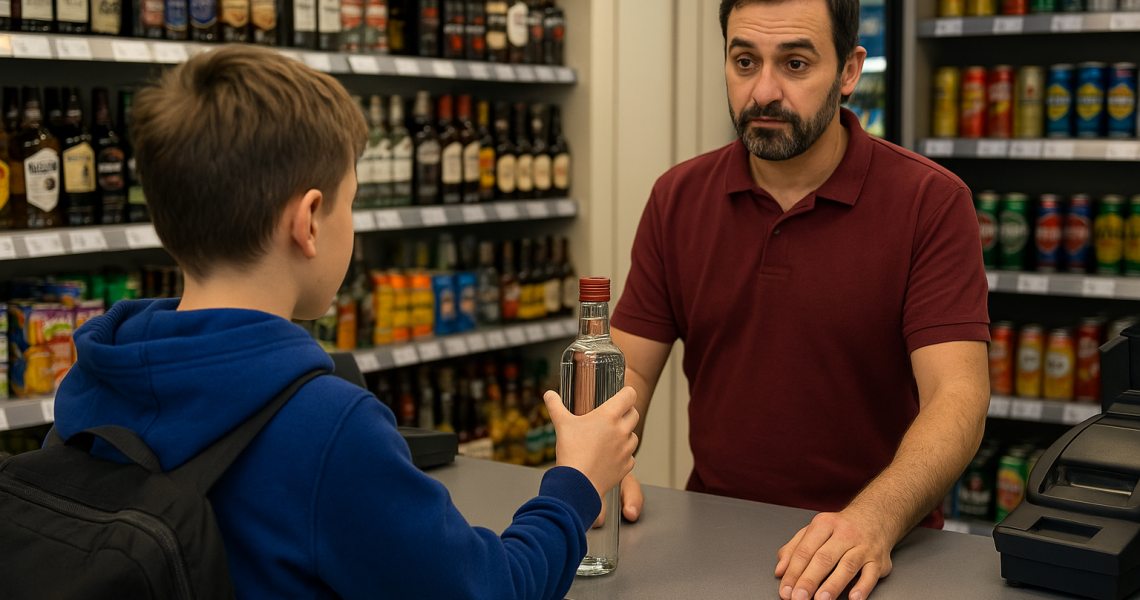- A French high school. A Thursday night. And a drink bought without checking: “Was I asked for my ID? No. I was told: ‘It’s for my brother’s birthday'”. This extract, taken during a control operation, reveals an alarming fact: the ban on the sale of alcohol to minors does exist… but all too often it remains a dead letter.
A clear ban, but little enforcement
The rule is unequivocal: any sale of alcoholic beverages to minors under the age of 18 is prohibited. Santé et Autonomie+2Légifrance+2
However, on the ground, compliance with this law leaves something to be desired.
Revelation surveys carried out among supermarket chains show that a majority still sell alcohol to minors without requiring proof of age. Economiematin+2blog.addictions-france.org+2
This situation begs the question: who, in the shops or bars, is really responsible for checking proof of age? Many let it go.
The role of cashiers and the pressure of commerce
When a young person pays for an €8 bottle, with a bag or a can, the question arises: should the cashier systematically check?
The legal answer is yes.
But the reality in the field is different. The pressure of the flow, the appearance of the customer, the speed of the purchase… too many factors encourage inaction.
The French Public Health Code imposes an obligation: “The person issuing the drink requires the customer to produce proof of his majority.” Légifrance
And yet: few controls, limited sanctions, less vigilance.
When selling alcohol to minors becomes a public health issue
Alcohol consumption among young people, when it starts early, has lasting effects: learning disorders, altered brain maturation, increased risk of dependence. Addictions France+1
A 15-year-old who freely buys a “recreational” drink is already on the road to becoming a potentially alcohol-dependent adult.
However, few establishments are sanctioned on a long-term basis. Reporting remains low, as do prosecutions.
This leads to the alarming observation that implementation of the law remains an adjustment variable. Meanwhile, young people are paying the price.
Act before it’s too late
If you are a parent, teacher or business owner, this fact should not paralyze you, but rather mobilize you.
Here are a few practical suggestions:
- Introduce systematic age verification in all shops.
- Train teams to spot risky behavior: late purchases, visible bags, group purchases.
- Talk to young people. Explain that alcohol is not just a “party”, but a product that changes everything: body, brain, life.
- Offer alcohol-free alternatives so that the pleasure remains, but without the risks.
Shops too have a role to play: reminding people of the rules, clearly displaying the ban, refusing to sell to a young person without proof of age. It’s a question of collective responsibility.
A shared responsibility
Selling alcohol to minors is not just an individual failure.
It’s a collective failure: distribution, legislation, supervision, education.
Every player has a role to play: from the cashier who has to ask for his ID card, to the manager who has to train his team, to the community which has to monitor.
And right up to the parent who has to talk to his child about this gesture which can slide into addiction.
Conclusion
Trade and the law are today out of balance.
Selling alcohol to a minor should no longer be the slightest offence: it’s a major risk to public health.
Acting to ensure that the law doesn’t remain a mere display: it’s everyone’s responsibility.
Because behind every drink sold too early, a life can be turned upside down.
